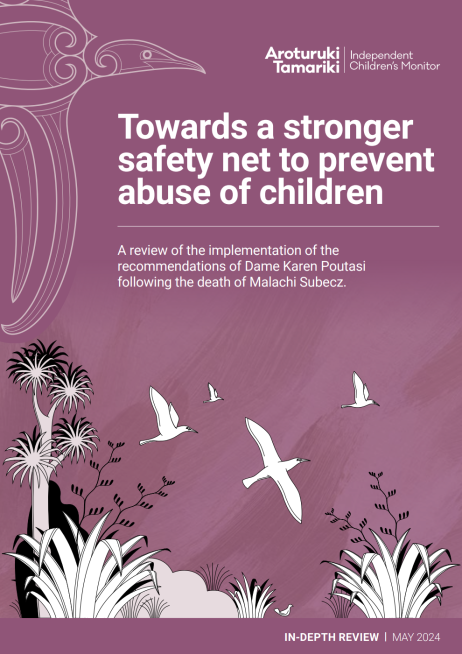Towards a stronger safety net to prevent abuse of children
A review of the implementation of the recommendations of Dame Karen Poutasi following the death of Malachi Subecz

About this report
Malachi Subecz was not in State care but reports of concern had been made about him. Six government agencies completed reviews of their own processes, and chief executives also commissioned a system-wide review from Dame Karen Poutasi (the Poutasi review). The Poutasi review referred to there being those who tried to act but were not listened to, those who were uncertain but did not act, and those who knew but chose not to act.
This report looks at whether the recommendations made by the Poutasi review have been actioned. It also looks at whether the actions arising from the individual agencies’ own reviews have been completed and whether are safer as a result.
Our report found that tamariki (children) are no safer now than when Malachi died.
Downloads, alternative versions and related links




- Publication Date
- 01 August 2024
- Category
- Deep Dive
- ISBN
- 978-0-473-71616-5
This report looks at the implementation of the recommendations made by Dame Karen Poutasi in her review of the children’s sector identification and response to suspected abuse following the death of Malachi Subecz.
Dame Karen’s review was not the first to look into the failure of state agencies to keep a child safe from abuse. She quotes from other reviews dating back more than two decades. One of her recommendations was that we, in our new system-wide role, monitor the implementation of the recommendations made in her report after 12 months.
This is our first in-depth review to be commissioned by request. It is perhaps also the most important, addressing the fundamental question of whether are being kept safe from harm. The progress to date was disappointing.
The lack of urgency, and what appears to be a lack of priority given to addressing child abuse in New Zealand, is hard to understand. While it is important not to make hasty decisions that may have unintended consequences, it is concerning that there has not been greater progress.
Sadly, the death of Malachi is not an isolated incident. Data from Child Matters shows that on average, one child in New Zealand dies because of abuse every five weeks1. Most of these children are under five years of age, and the largest group is under one year old. This is one of the highest rates in the OECD.
It is imperative that change occurs. Reviews of deaths of children from abuse going back more than two decades have made similar recommendations to the Poutasi review. This suggests that any changes made in response to earlier reviews have not addressed the root causes of why the system is failing to respond to harm at the earliest possible opportunity.
In her 2022 review, Dame Karen noted Mel Smith’s words from his 2011 review of a case of serious abuse: “this is a heinous crime” and “whatever needs to be done must be done”. Regrettably, as Dame Karen found in 2022, these words still need repeating.
As a country, we have shown we can make significant change when needed. Notably the response to Covid-19, which required responses across agencies and a number of legislative changes. When a matter is identified as a national priority, action can happen quickly.
We will continue to monitor implementation of Dame Karen’s recommendations, and of the actions outlined in agency reviews, and report on this again in another 12 months.
Arran Jones Chief Executive
Nova Banaghan Chief Monitor
Our heartfelt thanks go to those who shared information with us for this report.
We acknowledge the of Malachi Subecz, some of whom met with us. We hope our next report can give you confidence that, for other and their families, those who know are taking action, and those who take action are being listened to.
We are grateful to the Oranga Tamariki kaimahi who met with us and talked so openly about their in the hope that things will improve for tamariki.